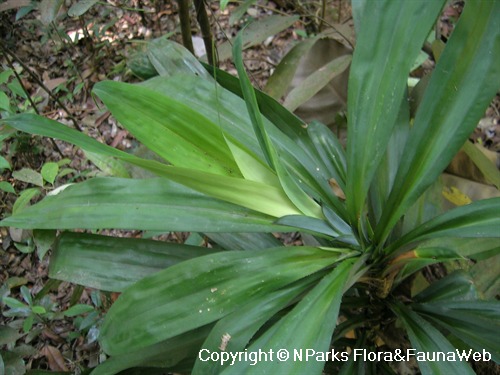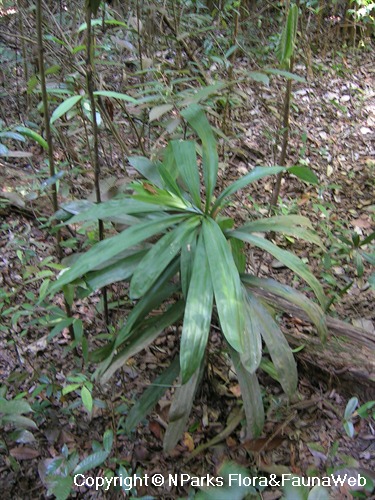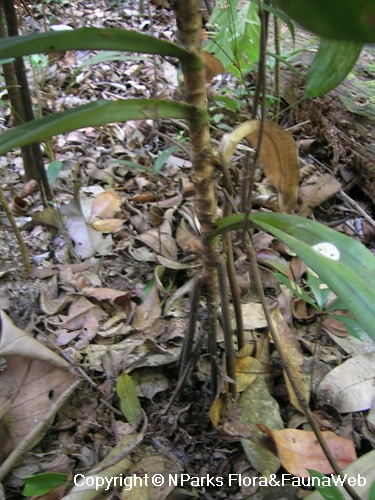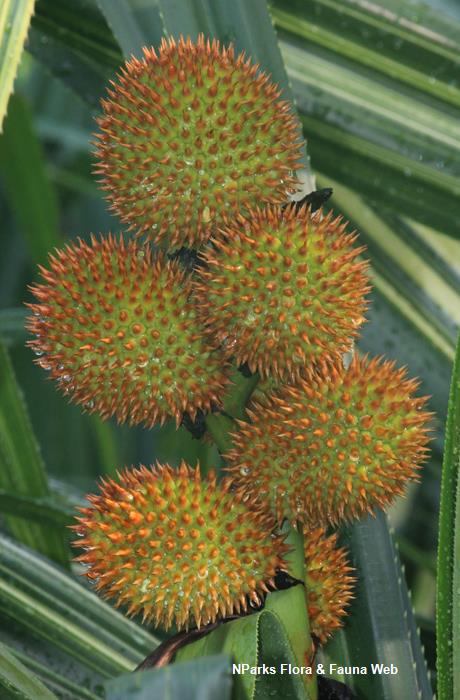
Back
Benstonea parva (Ridl.) Callm. & Buerki
| Family Name: | Pandanaceae |
| Synonyms: | Pandanus parvus Ridl. |
Benstonea parva is a semi-shade shrub that grows up to 3 m tall. It is naturally occuring in lowland forests to montain rainforests at elevations up to 1,500 m. This species is characterised by its distinctively broad leaves that taper abruptly to the leaf tip, and has dark green on the upper surface while the underside exhibit a greyish or bluish waxy coating appearance on the under surface. The plant produces globse to broadly ovoid fruit with pineapple-like form.
Name
Classifications and Characteristics
| Plant Division | Angiosperms (Flowering Seed Plants) (Monocotyledon) |
|---|---|
| Plant Growth Form | Herbaceous Plant |
| Lifespan (in Singapore) | Perennial |
| Mode of Nutrition | Autotrophic |
Biogeography
| Native Distribution | Peninsular Malaysia, Singapore and Borneo. |
|---|---|
| Native Habitat | Terrestrial |
| Preferred Climate Zone | Tropical |
| Local Conservation Status | Native to Singapore (Endangered (EN)) |
Description and Ethnobotany
| Growth Form | A terrestrial, slender shrub that grows from 0.5 to 3 m tall. <2> |
|---|---|
| Foliage | The leaves are dark green above and pale glaucous (covered with greyish or bluish waxy coating that can be rubbed off) below. The leaf measures 18 - 60 cm long and 1 - 4.8 cm wide. The broad leaves have abruptly caudate and flagellate leaf tips. These flagellum (hair-like structure) is 2 - 9 cm long. |
| Flowers | The style is horn-like, measuring 2.5 - 6 mm long, and is sharply curved upwards. |
| Fruit | Syncarp (compound fruit) is globose to broadly ovoid, located at the terminal, measuring 1.8 - 5.5 cm long and 1.7 - 4 cm wide. |
| Habitat | This species grows in lowland to montane rainforests at altitude up to 1,500 m. |
| Etymology | The genus Benstonea is named in honour of Benjamin Clemens Stone (1933-1994) who was the leading authority on Pandanaceae family for several decades. |
Landscaping Features
| Desirable Plant Features | Ornamental Foliage |
|---|
Fauna, Pollination and Dispersal
| Pollination Method(s) | Biotic (Fauna) |
|---|
Plant Care and Propagation
| Light Preference | Semi-Shade |
|---|---|
| Water Preference | Little Water |
| Plant Growth Rate | Moderate |
| Propagation Method | Seed |
Foliar
| Foliage Retention | Evergreen |
|---|---|
| Mature Foliage Colour(s) | Green |
| Mature Foliage Texture(s) | Smooth |
| Prominent Young Flush Colour(s) | Green |
| Young Flush Texture(s) | Smooth |
| Foliar Type | Simple / Unifoliate |
| Foliar Arrangement Along Stem | Rosulate / Rosette |
| Foliar Attachment to Stem | Sessile |
| Foliar Shape(s) | Non-Palm Foliage (Linear) |
| Foliar Venation | Parallel |
| Foliar Margin | Ciliate / Hairy |
| Foliar Apex - Tip | Caudate |
| Foliar Base | Clasping |
| Leaf Area Index (LAI) for Green Plot Ratio | 3.5 (Shrub & Groundcover - Monocot) |
Floral (Angiosperm)
| Flower Grouping | Cluster / Inflorescence |
|---|---|
| Flower Location | Terminal |
Fruit, Seed and Spore
| Fruit Classification | Aggregate Fruit (Syncarp) |
|---|---|
| Fruit Type | Fleshy Fruit |
References
| References | <1> Callmander, M.W., Lowry II, P.P., Forest, F., Devey, D.S., Beentje, H., Buerki,S. (2012). Benstonea Callm.& Buerki (Pandanaceae): characterization, circumscription, and distribution of a new genus of screw-pines, with a synopsis of accepted species. Candollea 67(2):323-345. <2> Callmander, M.W. & Buerki, S. (2016). Two new threatened species of Benstonea Callm. & Buerki (Pandanaceae) from Sabah (Borneo, Malaysia). Candollea 71(2):257-263. |
|---|
Image Repository
Others
| Master ID | 1006 |
|---|---|
| Species ID | 2300 |
| Flora Disclaimer | The information in this website has been compiled from reliable sources, such as reference works on medicinal plants. It is not a substitute for medical advice or treatment and NParks does not purport to provide any medical advice. Readers should always consult his/her physician before using or consuming a plant for medicinal purposes. |



